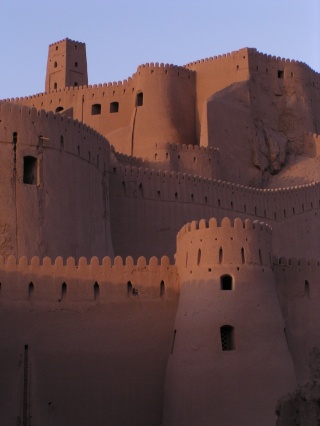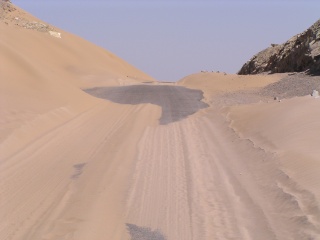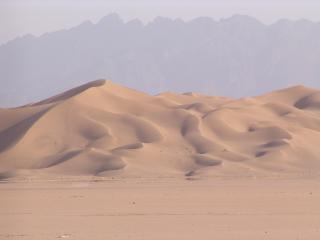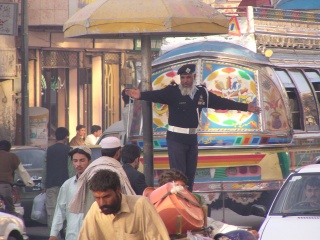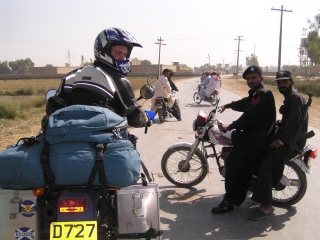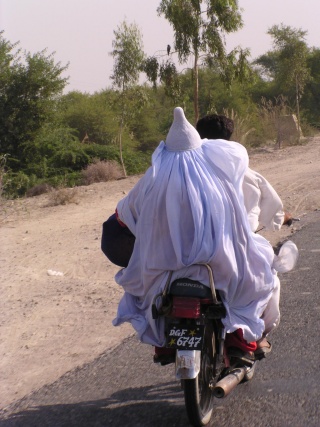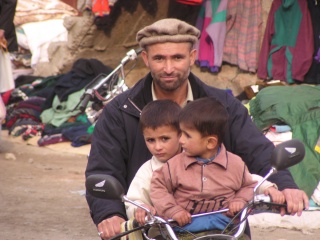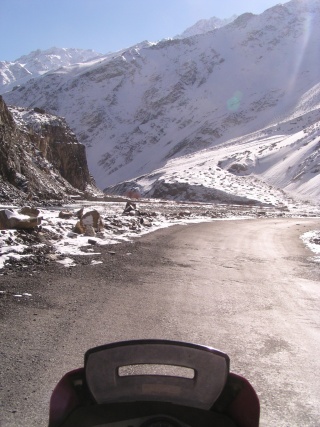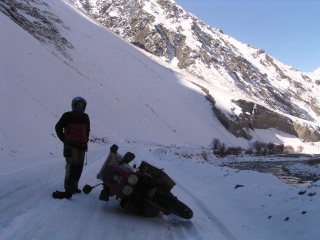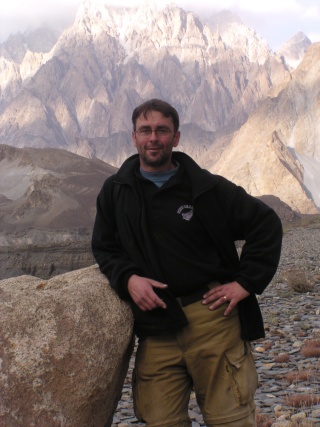Pakistan
Deserts are hot, mountains are cold. A rather obvious concept that has been reinforced by our experiences here in Pakistan.
From Bam in Iran through to Quetta in Pakistan is a 1000km ride across the desert through the bad lands of Baloucistan.
Bam, a small oasis town covered in date palms with an amazing old adobe citadel, had seemed warm to us but it was only a foretaste of what was to come.
Leaving Bam we rode out across open desert and the temperature rocketed to the high 30s. For the most part we were riding across a barren rocky landscape devoid of any vegetation, with mirages appearing as lakes in the distance surrounding us and occasionally passing camels that seemed to be surviving off roadside rubbish.
We arrived at the border around 4pm planning to complete all formalities that day so we could get on the road early the following morning, however this was not to be. Ramazan had just started and customs and immigration officials took this as the perfect excuse to close the border early, so we were left camping in the customs compound on the wrong side of the Pakistan border.The next morning we were first in line for border formalities and 2 hours later, having completed them we were riding towards Quetta.
We got a bit of a shock when we found ourselves on the same side of the road as the first oncoming car. Traffic switches from driving on the right side of the road in Iran to the left in Pakistan but there is nothing at the border to inform you which caught us off guard.
click here to find shade in the desert
For the first 200km we were on a quality two-lane road but then road conditions deteriorated as the desert started to encroach and in many places dunes were spreading across the surface. It narrowed to single track and became increasingly rough. We passed some huge, beautiful sand dunes, colourfully dressed tribal folk with camel trains and big mountains off in the distance.
click here to see desert petrol station
The old colonial town of Quetta provided our first chance to relax for a day, change the oil and do some other bike maintenance. We loved the vibrancy of colours in womens clothing and more relaxed feel after Iran. We caught up to Kenny McLean from Scotland again, and he has travelled with us for 2 weeks on his Armstrong 500.
click here to see kenny in the traffic
The police are desperate to ensure tourists do not have any problems as the country has had far too much bad press in the world media, which has ensured we have more contact with the police forces than we would choose.
Arriving in towns we have often had armed police guards accompany us around town and sit outside our hotel room all night. In Dera Gazi Khan hotelliers and police told us we could not stay there and would have to ride a couple of hours to the next town. After lengthy discussions during which we told them it was too dangerous for us to ride at night they finally relented and granted us permission to get a room.
click here to see Punjab Elite Police
Through Sind and Punjab states we were provided with a relay system of escorting police pickups which provided us with much amusement. They like to drive in front or in the lane beside us, siren blaring and force all other traffic off the road. A handy way to get through towns rapidly. The state of the vehicles and police sent for escort duties has varied from Punjab Elite Police VIP anti-terrorist squads to local cops in clapped out old pickups that struggle to do 50 km/hr. Needless to say we dont want to travel this slowly all day so we soon burn the cops off which must frustrate them.
For the past week or two we have been enjoying the delights of mountainous northern Pakistan and the Karakoram Highway.
The Karakoram Highway (KKH) is an amazing feat of engineering. Constructed between 1967-78 as a joint venture between Pakistan and China at the cost of 400 lives, 1,000 trucks and 8,000,000 kilos of dynamite, this sinuous route winds up through the tangle of mountain chains where the Himalaya, Karakoram and Hindu Kush meet, to connect Islamabad and the plains of Pakistan with Xinjiang and the might of China.
Its also a damn good ride. 800 kilometres up from Islamabad to the Khunjerab Pass, the 4733m high border with China. The road winds through deep gorges and up through snow clad peaks passing terraced hillsides and mountain communities that were independent principalities 100 years ago.
From Gilgit north the road winds through some stupendous mountain scenery that had us going WOW every time we rounded a corner, up to the Pakistani border town at Sost.
November is not the ideal time to be visiting the mountains as winter is fast closing in. We had suspected we would not be able to journey up the KKH this late in the season but have been pleasantly surprised to find it still passable. Almost.
click here to see how we cope with ice
From Sost it is a further 80km to the top of the Khunjerab Pass and China. We were not planning on visiting China due to the prohibitive expense involved in taking a motorbike there, but couldnt resist trying to ride up to the pass, despite the fact that we were informed it was snow covered and very cold.
Our attempt, alas, was doomed to failure. We managed to get about halfway to the pass before we were beaten back by the snow and ice on the road.
click here to see Kenny on the ice
Kenny left us in Sost to hurry down towards India as his visa was running out. It has been a pleasure having company and riding with another bike and we wish Kenny the best for the rest of his travels.
We have been about a week returning to Gilgit, an easy days ride from Sost, as we have stopped in a couple of villages to hike in the hills and wander around the villages.
From the hot deserts to the icy mountains, Pakistan has been full of contrast and a fascinating country to visit. The friendliness and hospitality shown to us will forever be enduring memories.

